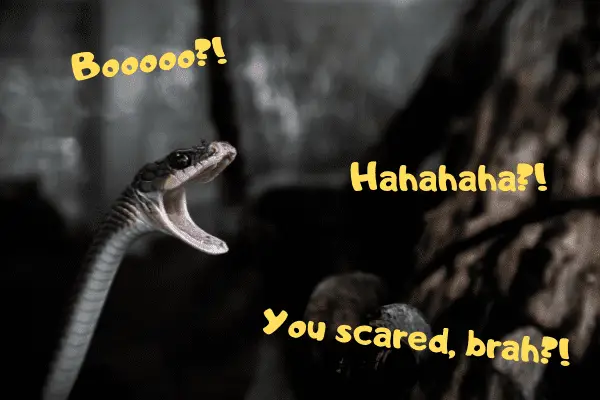Do snakes lay eggs…? This question pops up a lot and isn’t as simple as it may first appear. You may be thinking that snakes are reptiles, and therefore snakes lay eggs, but it’s a little more complicated than that!
In this blog post, we’ll answer the questions “do snakes lay eggs?”& “do all snakes lay eggs? As well as dive deeper into the topic of how snakes lay eggs and how the whole process goes.
So, if you’re looking to enrich your knowledge about snake egg laying, then read on!

Table of Contents
How do snakes have babies?
So, how do snakes have babies? Well, the process starts in the same way as with most animals. The male and female snake start mating, and once the female is fertilized, they stop.
Up until this point, it all seems pretty normal. However, after the female is fertile, things get a little weird…
To start with, there are a number of snakes which can carry a males sperm with them for years on end. They can then choose when to “impregnate themselves” and start the egg laying process.
This brings us to the next part of this article…
Do snakes lay eggs?
Most snakes lay eggs, but there are some species which don’t. These species still produce eggs though. However, unlike most snakes which lay their eggs, these snakes incubate their eggs inside their body. This is called ovoviviparous.
This allows them to carry the eggs with them and then give birth to live young. This is not the same process as with mammals though!
There are also snake species which are viviparous, which means they give birth to live young, but don’t have an egg inside them that hatches. Boa constrictors are a great example of viviparous snakes.
This comes with some advantages, as they rear young inside them and nourishment is provided through the placenta.
So, the answer to “do snakes lay eggs?” is simply no, they don’t all “lay” their eggs as most snakes do. Most lay eggs, some carry their eggs and give birth to young while others nourish babies inside them by means of a placenta and don’t have an egg inside them at all.
Viviparous snake species are often found in colder climates, but there are some that can be found in warmer areas as well. Our article called do garter snakes lay eggs is a great example of a snake that lives in a colder climate.
Once you’re done reading this, why not check out our post on whether or not snakes have tails?
Incubation
When it comes to caring for their young, snakes aren’t the most dedicated parents. The viviparous snakes keep the snakes inside until they give birth to live young. However, after these young come out, they don’t provide any further care for them.
Some egg-laying snakes do provide some care when it comes to incubation though. Sometimes, eggs are buried to provide them with some added protection and insulation. Some snakes, like pythons, will curl up around their eggs to keep them warm and protect them.
When breeding these types of snakes, there are often one or two eggs that don’t quite fit. These are often infertile but are sometimes healthy too.
What snakes lay eggs?
If we were to list them all, then we’d be here all day! Some examples of popular snake species that lay eggs are pythons and corn snakes.
As we’ve already said, most snakes lay eggs so the list coming up next is going to be more useful…
Which snakes don’t lay eggs?
Some of the snakes that give birth to live young include vipers, rattlesnakes, boas and garter snakes. There are also other reptiles that give birth to live young too! A popular example is the blue tongue skink, which is ovoviviparous.
Did you know there are certain snakes who have a tendency to eat themselves? Find out why in our post on why snakes eat themselves.
Conclusion
In this post you’ve learned the answer to the question “do snakes lay eggs?” and we’re sure you’ve learned something new in this post. You’ve learned the difference between viviparous and ovoviviparous snakes and learned about incubation in the wild.
If there’s anything you feel we’ve forgotten in this past on snake egg laying, then feel free to reach out to us or leave a comment. We’re always looking to improve our resources and really appreciate any feedback.
